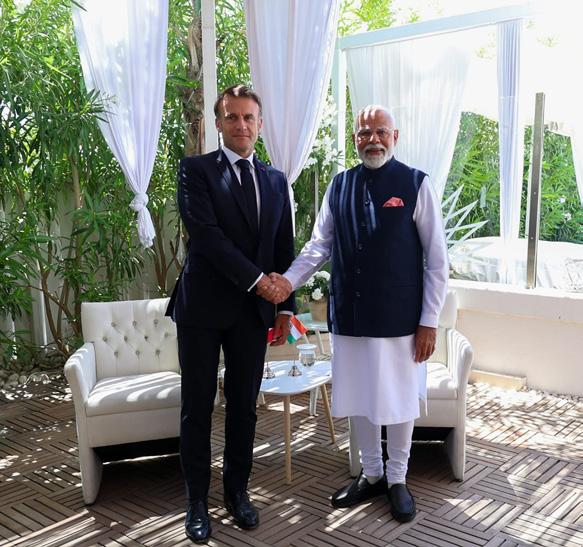
3 minute read
Strengthening India’s defence and foreign policy
By Shauvik Ghosh
India’s Prime Minister Narendra Modi's recent engagements at the G7 Summit in Italy have underscored India's unwavering commitment to bolstering its defence capabilities, driving the 'Make in India' initiative, and cementing its role as a pivotal player in global affairs. The strategic cooperation agreement with French President Emmanuel Macron marks a significant stride in India's journey towards selfreliance and robust foreign policy.
Intensifying strategic defence cooperation
India's relationship with France has emerged as a cornerstone of its defence strategy. The agreement between Modi and Macron to intensify strategic defence cooperation highlights a mutual recognition of the necessity for a strong bilateral partnership to ensure global stability. The focus on the 'Make in India' initiative is particularly noteworthy, reflecting India's resolve to achieve self-reliance in key defence sectors.
G7 Summit: Building diplomatic bridges
The G7 Summit provided a platform for PM Modi to engage with several world leaders, emphasizing India's proactive approach in international diplomacy. Macron, being the first leader to meet Modi, signifies the special bond between India and France. Modi's meetings with British PM Rishi Sunak and Ukrainian President Volodymyr Zelenskyy further underscore India's strategic diplomacy aimed at fostering global peace and cooperation.
India-France strategic partnership
France stands as India's closest strategic partner in Europe, with the two nations having built a robust framework of cooperation, especially in the realms of security and defence. The ongoing negotiations for acquiring 26 Rafale jets for the Indian Navy, following the earlier procurement of 36 jets for the Air Force, reflect the deepening defence ties. These deals, worth billions, are not mere transactions but signify a longterm commitment to strategic partnership and mutual security.
Global and regional issues: A unified stance
The exchange of views between Modi and Macron on global and regional issues underscores the aligned visions of both countries for a stable and prosperous world order. Their discussions covered a wide array of topics, from defence and nuclear cooperation to space exploration and climate action. This holistic approach highlights the comprehensive nature of their partnership, aiming to address both immediate security concerns and long-term global challenges.
Roadmaps and future cooperation
The review of bilateral relations with a focus on the 'Horizon 2047' and Indo-Pacific roadmaps points to a forward-looking strategy. These roadmaps envisage extensive cooperation in emerging technologies, digital infrastructure, education, and cultural initiatives. The agreement to expand cooperation in AI, critical technologies, energy, and sports further cements the multifaceted nature of the India-France partnership. Plans to work closely in upcoming global conferences demonstrate a commitment to collaborative solutions for global issues.
Defence agreements: Building for the future
During Modi's visit to France last July, significant agreements were signed to deepen defence cooperation. These included the development of submarines, jet engines, and helicopter engines, emphasizing co-production and technological collaboration. The joint development of a combat aircraft engine and an engine for India's multi-role helicopter program reflects a shared vision for advanced defence capabilities and technological innovation.
Diplomacy and peace: A balanced approach
PM Modi's meeting with Ukrainian President Zelenskyy and his continued advocacy for a peaceful resolution to the Ukraine conflict underscore India's balanced approach in global diplomacy. Modi's emphasis on dialogue and diplomacy, as reiterated in his message to Russian President Putin, has garnered international praise. This approach aligns with India's broader foreign policy objectives of promoting peace and stability through constructive engagement.
(The writer is a political scientist and commentator. The views expressed are his own.)









